外研版(2019)必修 第一册Unit 3 Family matters Using language课件(共13张PPT)
文档属性
| 名称 | 外研版(2019)必修 第一册Unit 3 Family matters Using language课件(共13张PPT) | 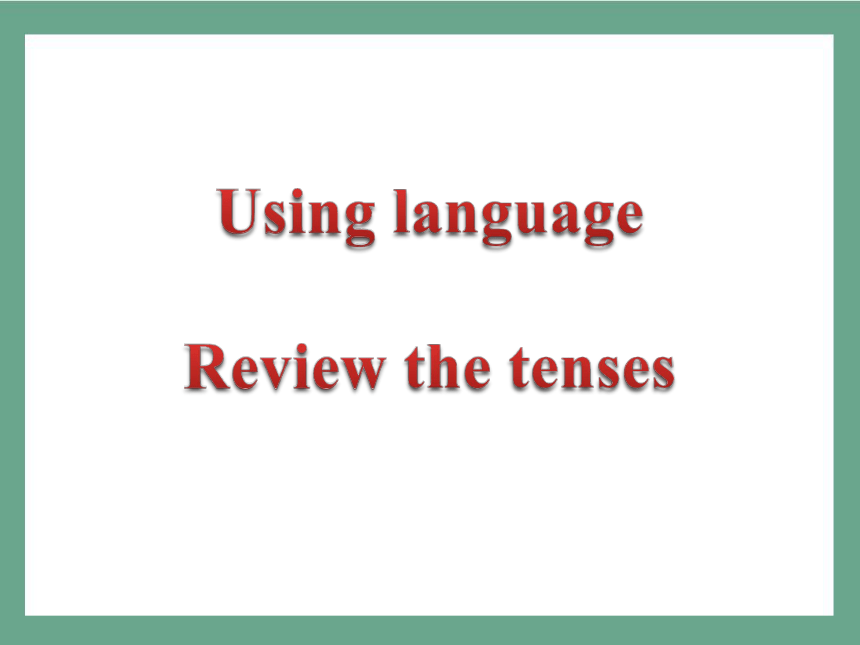 | |
| 格式 | pptx | ||
| 文件大小 | 73.0KB | ||
| 资源类型 | 教案 | ||
| 版本资源 | 外研版(2019) | ||
| 科目 | 英语 | ||
| 更新时间 | 2023-04-25 21:44:42 | ||
图片预览

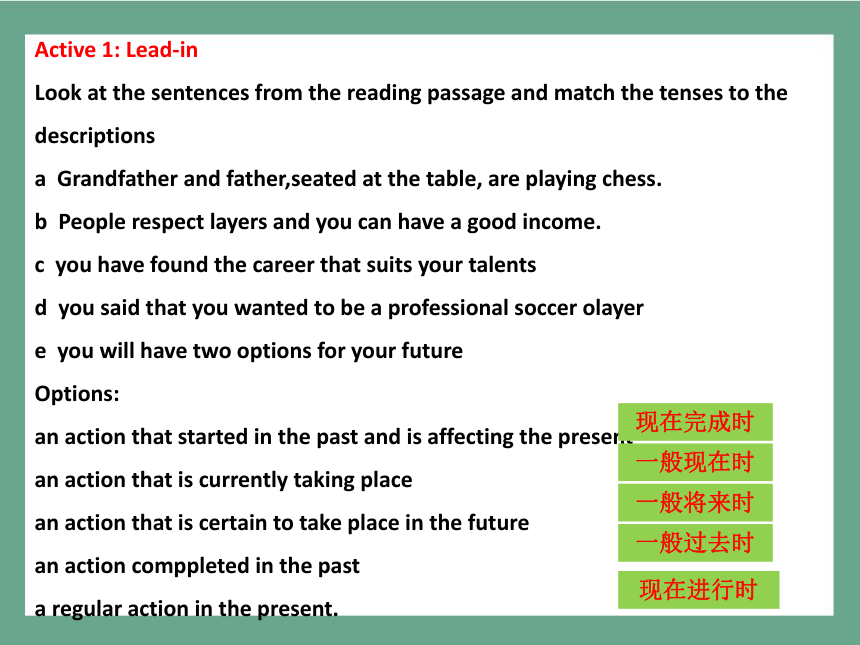
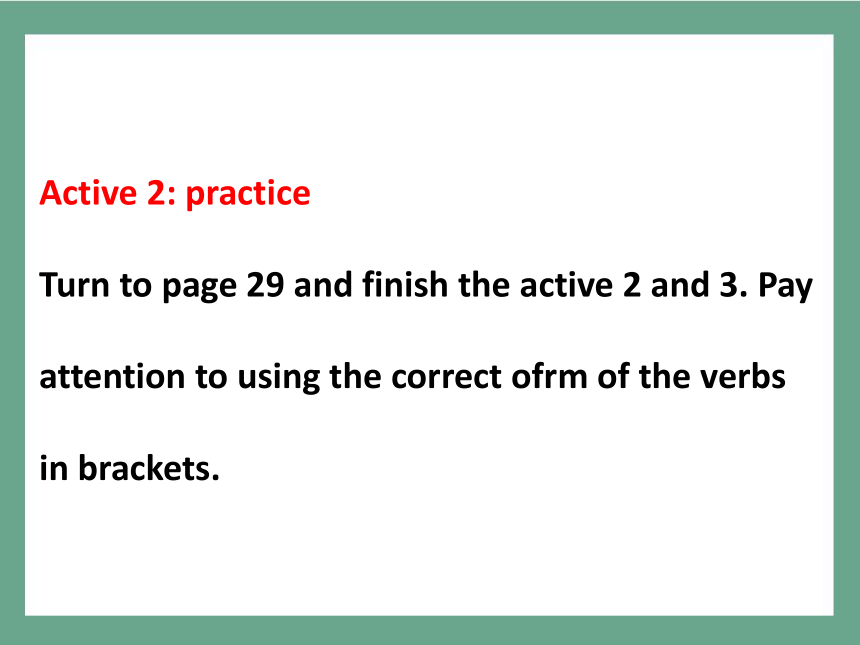

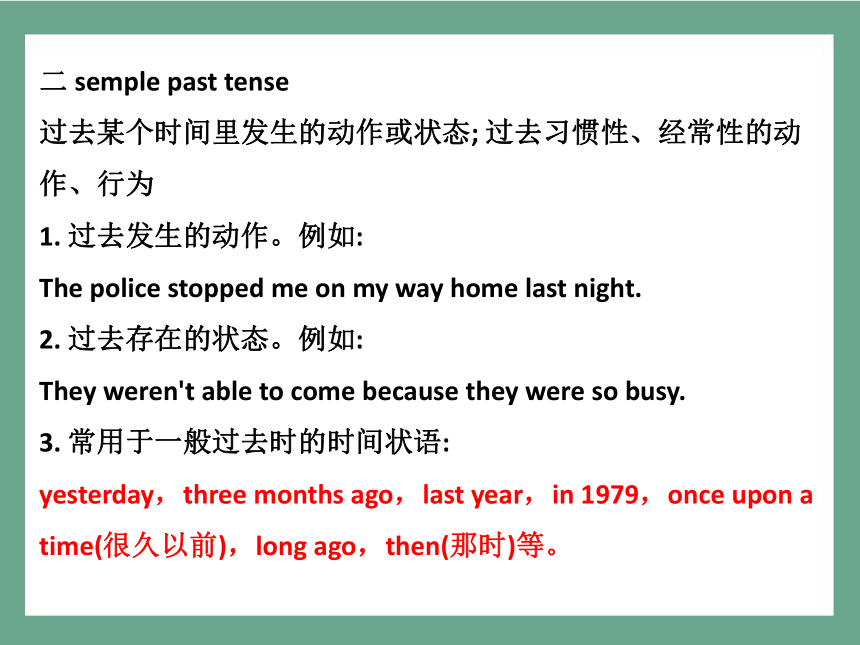
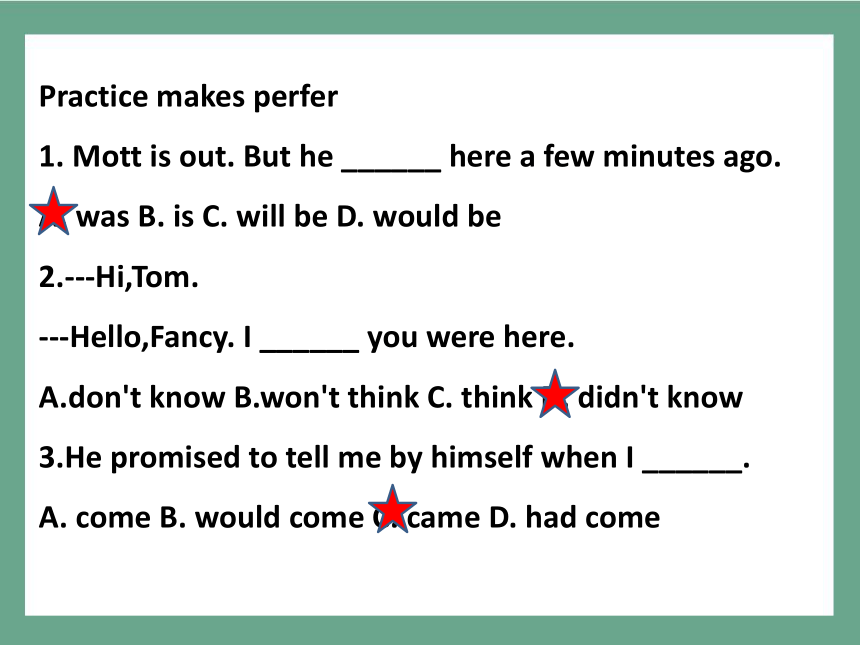
文档简介
(共13张PPT)
Using language
Review the tenses
Active 1: Lead-in
Look at the sentences from the reading passage and match the tenses to the descriptions
a Grandfather and father,seated at the table, are playing chess.
b People respect layers and you can have a good income.
c you have found the career that suits your talents
d you said that you wanted to be a professional soccer olayer
e you will have two options for your future
Options:
an action that started in the past and is affecting the present
an action that is currently taking place
an action that is certain to take place in the future
an action comppleted in the past
a regular action in the present.
现在完成时
一般将来时
一般过去时
现在进行时
一般现在时
Active 2: practice
Turn to page 29 and finish the active 2 and 3. Pay attention to using the correct ofrm of the verbs in brackets.
Active 3 Brief summary of the Tenses
一 simple present tense
1表示经常性或习惯性的动作或存在的状态
2表示客观事实或普遍真理
3在时间、条件等状语从句中,用一般现在时表示将来
Practice makes perfect
1 The table __________ (feel )soft.
2 Japan __________(live) in the east of China.
3 The shop ___________(close) at 7:30 p.m.
4 Father ___________(not)smoke.
5 If you ________(go) there,I'll help you.
feels
lives
closes
doesn’t
goes
主 将 从 现
二 semple past tense
过去某个时间里发生的动作或状态; 过去习惯性、经常性的动作、行为
1. 过去发生的动作。例如:
The police stopped me on my way home last night.
2. 过去存在的状态。例如:
They weren't able to come because they were so busy.
3. 常用于一般过去时的时间状语:
yesterday,three months ago,last year,in 1979,once upon a time(很久以前),long ago,then(那时)等。
Practice makes perfer
1. Mott is out. But he ______ here a few minutes ago.
A. was B. is C. will be D. would be
2.---Hi,Tom.
---Hello,Fancy. I ______ you were here.
A.don't know B.won't think C. think D. didn't know
3.He promised to tell me by himself when I ______.
A. come B. would come C. came D. had come
三 simple future tense
表示将来某一时刻的动作或状态或将来某一段时间内经常的动作或状态。
1.一般将来时表示将要发生的动作或情况。
例如:I will(shall) arrive tomorrow.我明天到。
(主语是第一人称时最好用shall)
Will you be free tonight 你今晚有空吗
We won't (shan't) be busy this evening. 我们今晚不忙。
2."be going to+动词原形"表示即将发生的或打算进行的事。
1)It is going to rain.
2)We are going to have a meeting today.
3. "be to+动词原形"表示按计划要发生的事或征求对方意见。:
1)Are we to go on with this work
2)The boy is to go to school tomorrow.
4."be about to+动词原形"表即将发生的动作,意为:立刻,马上。后面一般不跟时间状语。
We are about to leave.
四The Present Continuous Tense
表示现在正在进行的动作;.表示现阶段正在进行或从事的动作
可用来表示现在进行时的时间状语,常用的有:now,this week,right now 等;或者告诉你一个准确的现在时间,或者用look,listen(常用于句子的开头,表示提醒听者注意正在发生的事情)。
◇They are playing basketball now.
现在,他们正在打篮球。
◇Listen, She is singing an English song.
听,她正在唱英文歌。
◇Look at the picture. The children are flying kites in the park.
看这幅图。那些孩子正在公园放风筝。
◇We are making model planes these days.
这些天我们在做飞机模型。
◇It's 6:30 now. I am getting up.
现在是6:30,我正在起床。
五The Present Perfect Tense
过去发生的动作对现在造成的影响;过去的动作或状态持续到现在并且已经完成
表示影响或结果
He has been away from the city.
他已离开这个城市。(结果:他不在这个城市。)
Someone has broken the window.
有人把窗户打破了。(结果:窗户仍破着。)
I have lost my pen.
我把钢笔丢了。(结果:我现在无钢笔用。)
He has finished his work.他把工作做完了。
(结果:他可以做其他的事了。)
表示持续
He has taught in our school for 30 years.
他在我们学校教书已有30年了。
He has been busy since last week.
自上个星期以来他一直很忙。
He has worked for us ever since he left school.
他离开学校以后就一直为我们工作。
Active4 Reading Practice: Describing physircal appearances
一、Read the passage on page 30 and answer the questions
1. How dose Penny look different now compared to ten years ago
2.What does Penn y’s mum look like now and why
3. What did penny’s dad look like ten years ago
二、Work in pairs and describe how your family menmbers have changed
Active 5 Listening Practice:
Listen to the conversation and complete Alice’s Journal entry.
Active 6 Homework
Using different tenses to make sentences.
Using language
Review the tenses
Active 1: Lead-in
Look at the sentences from the reading passage and match the tenses to the descriptions
a Grandfather and father,seated at the table, are playing chess.
b People respect layers and you can have a good income.
c you have found the career that suits your talents
d you said that you wanted to be a professional soccer olayer
e you will have two options for your future
Options:
an action that started in the past and is affecting the present
an action that is currently taking place
an action that is certain to take place in the future
an action comppleted in the past
a regular action in the present.
现在完成时
一般将来时
一般过去时
现在进行时
一般现在时
Active 2: practice
Turn to page 29 and finish the active 2 and 3. Pay attention to using the correct ofrm of the verbs in brackets.
Active 3 Brief summary of the Tenses
一 simple present tense
1表示经常性或习惯性的动作或存在的状态
2表示客观事实或普遍真理
3在时间、条件等状语从句中,用一般现在时表示将来
Practice makes perfect
1 The table __________ (feel )soft.
2 Japan __________(live) in the east of China.
3 The shop ___________(close) at 7:30 p.m.
4 Father ___________(not)smoke.
5 If you ________(go) there,I'll help you.
feels
lives
closes
doesn’t
goes
主 将 从 现
二 semple past tense
过去某个时间里发生的动作或状态; 过去习惯性、经常性的动作、行为
1. 过去发生的动作。例如:
The police stopped me on my way home last night.
2. 过去存在的状态。例如:
They weren't able to come because they were so busy.
3. 常用于一般过去时的时间状语:
yesterday,three months ago,last year,in 1979,once upon a time(很久以前),long ago,then(那时)等。
Practice makes perfer
1. Mott is out. But he ______ here a few minutes ago.
A. was B. is C. will be D. would be
2.---Hi,Tom.
---Hello,Fancy. I ______ you were here.
A.don't know B.won't think C. think D. didn't know
3.He promised to tell me by himself when I ______.
A. come B. would come C. came D. had come
三 simple future tense
表示将来某一时刻的动作或状态或将来某一段时间内经常的动作或状态。
1.一般将来时表示将要发生的动作或情况。
例如:I will(shall) arrive tomorrow.我明天到。
(主语是第一人称时最好用shall)
Will you be free tonight 你今晚有空吗
We won't (shan't) be busy this evening. 我们今晚不忙。
2."be going to+动词原形"表示即将发生的或打算进行的事。
1)It is going to rain.
2)We are going to have a meeting today.
3. "be to+动词原形"表示按计划要发生的事或征求对方意见。:
1)Are we to go on with this work
2)The boy is to go to school tomorrow.
4."be about to+动词原形"表即将发生的动作,意为:立刻,马上。后面一般不跟时间状语。
We are about to leave.
四The Present Continuous Tense
表示现在正在进行的动作;.表示现阶段正在进行或从事的动作
可用来表示现在进行时的时间状语,常用的有:now,this week,right now 等;或者告诉你一个准确的现在时间,或者用look,listen(常用于句子的开头,表示提醒听者注意正在发生的事情)。
◇They are playing basketball now.
现在,他们正在打篮球。
◇Listen, She is singing an English song.
听,她正在唱英文歌。
◇Look at the picture. The children are flying kites in the park.
看这幅图。那些孩子正在公园放风筝。
◇We are making model planes these days.
这些天我们在做飞机模型。
◇It's 6:30 now. I am getting up.
现在是6:30,我正在起床。
五The Present Perfect Tense
过去发生的动作对现在造成的影响;过去的动作或状态持续到现在并且已经完成
表示影响或结果
He has been away from the city.
他已离开这个城市。(结果:他不在这个城市。)
Someone has broken the window.
有人把窗户打破了。(结果:窗户仍破着。)
I have lost my pen.
我把钢笔丢了。(结果:我现在无钢笔用。)
He has finished his work.他把工作做完了。
(结果:他可以做其他的事了。)
表示持续
He has taught in our school for 30 years.
他在我们学校教书已有30年了。
He has been busy since last week.
自上个星期以来他一直很忙。
He has worked for us ever since he left school.
他离开学校以后就一直为我们工作。
Active4 Reading Practice: Describing physircal appearances
一、Read the passage on page 30 and answer the questions
1. How dose Penny look different now compared to ten years ago
2.What does Penn y’s mum look like now and why
3. What did penny’s dad look like ten years ago
二、Work in pairs and describe how your family menmbers have changed
Active 5 Listening Practice:
Listen to the conversation and complete Alice’s Journal entry.
Active 6 Homework
Using different tenses to make sentences.
